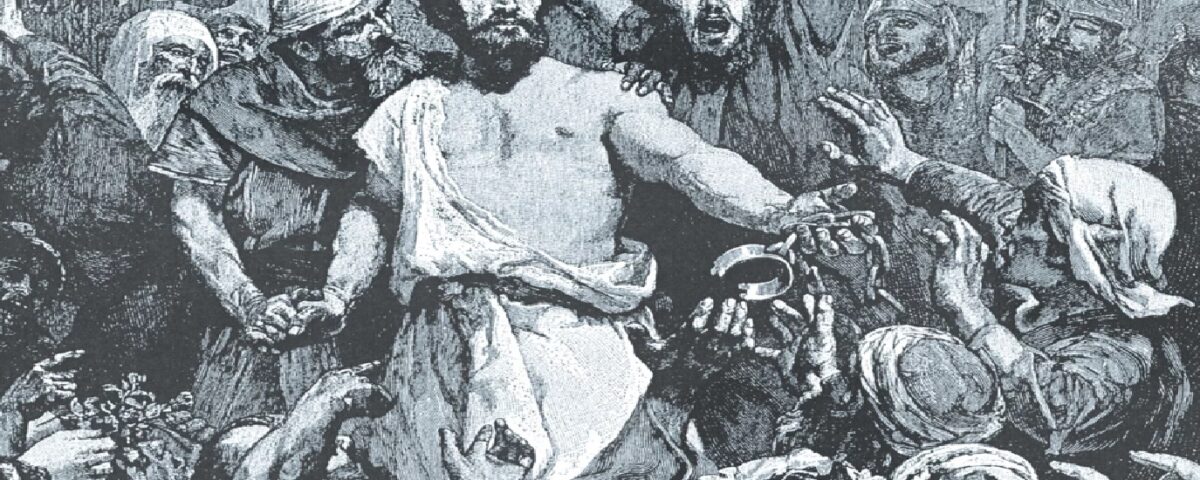
A story about two Lords
September 2, 2023
Shared titles not same Identity
September 30, 2023“Mere man” by F Paul Haney

Usually, the “mere man” argument goes like this:
“A mere man cannot be a sacrifice for all men; only the life of God could atone for all of mankind’s sins.”
This claim, however, is no more than human theory imposed on the Bible. A modicum of biblical research exposes the disputer’s error for what it is. Those who resort to this particular “straw man” fallacy sidestep the main issue of who deems any sacrifice sufficient to cover sins. It is God, not we, who decides what constitutes a sufficient sacrifice for the sins of mankind.
In an attempt arbitrarily to limit the terms of the debate, some proponents of the “Jesus is God/Man” theory insist that either Jesus was God or he was a “mere” man. There is no middle ground with them. But I reject the limiting proposal they establish and reject the term “mere” as not being applicable to Jesus or the debate. Facts: Jesus was a man, but he was no “mere” man. He is matchless. Jesus was (and is) the only begotten Son of God. His father was Yahweh. His mother was Mary. Jesus was miraculously conceived and begotten (i.e. by the Father, Matt. 1:20) without sin. He had a human lineage through Mary and was thus also the Son of David and thus the Messiah. Jesus, as the sinless Son of God, also the Son of Man, is worthy of our respect and worship as the Son of God. He is divine only in the sense that he is the exalted, uniquely begotten Son of God, and he sits at the right hand of the Father in heaven. He is to be praised for what he is, not for what people think or imagine he was. We must avoid at all costs constructing a Jesus of our own persuasions and church traditions, uncritically examined.
In addition, it must be admitted by thinking believers that Yahweh God, the Creator, the Father, can accept whatever sacrifice He deems sufficient to cover any number of sins for mankind, even for every person that has ever lived, or ever will live. God will have mercy and compassion by whatever means He wills, and we have nothing to say about it. God (not man) decided that certain animals would be acceptable as sin offerings for the whole land and nation of Israel, during the period of the Law. “And the priests killed them; and they presented their blood on the altar as a sin offering to make an atonement for all Israel, for the king commanded that the burnt offering and the sin offering be made for all Israel” (2 Chron. 29:24; cf. Lev. 4:20-21; 5:11-13).
Although animals have lesser value than humans, God deemed their spilled blood adequate to cover all the sins for all the people at that time. As a result, the “mere man” argument fails miserably. Who are we to argue with God and exalt our speculations above His revelation about His dealings with us?
This “mere man” objection never quite seems to go anywhere, or go away in spite of its obvious weaknesses. Yahweh God has all power, and with God, all things are possible. It should be clear that God deemed sufficient the yearly blood sacrifices of lambs, bulls, and goats for the sins of an entire nation of people. God also deemed sufficient the sacrifice of the Passover lamb. This in itself causes the collapse of the “mere man” argument.
Nor does it require much research to discover that the man Jesus (Rom. 5:15) was one of, and the last in, a long line of blood sacrifices (Rom. 6:10; Heb. 10:10, 12, 14). This is hardly rocket science! The huge difference between bloody animal sacrifices and Jesus was that God authorized Jesus to be the final and sufficient blood sacrifice for all atonement from that point forward. By contrast, animal sacrifices were temporary and had to be repeated every year (Heb. 10:3). The key phrase here is “God deemed or authorized.” The point is that neither the blood of animals nor the blood of Christ in itself, by itself, took away sins. Only the acceptance by God of His chosen sacrifice removes sins. Had God not accepted animal sacrifices, they would have been worthless and a waste of time. Had the Father not accepted Jesus as the final sacrifice, his sacrifice would have been valueless also (Isa. 53:10; Matt. 3:17; Col. 1:19-23). Believers have redemption (forgiveness) “through” the blood of Jesus, not “by” the blood in itself (Eph. 1:7; Col. 1:14). The sinless human “lamb” of God’s choosing is fully adequate for this purpose.
According to polytheistic Binitarian doctrine, it was not God that died on the cross, anyway. They say Jesus was not God then, but was “fully” man, Thus it follows that the man Jesus who died on the cross was not God after all! By their own testimony, God did not die for the sins of all mankind as they insist He must.
The brand of Binitarianism supported by many WCOG’s is the view of a relatively small group of people who contend that God is one, God is two, God is a family, God is a kingdom, and God is or will be millions and billions of God-beings. It is an unsound and bizarre doctrine. It is not biblical. In my opinion, it is irrational, self-contradictory, and evasive.
To illustrate our point consider the following dialogue between myself and Steven Collins from the Seattle conference as reported in The Journal of May 31, 2002, page 31, entitled, “Can God die?” (I added the explanatory bracketed parts.)
Paul Haney asked Mr. Collins about the concept of the loss of “divine life.” “Was Christ God at the time that he died on the cross?” Mr. Haney asked. “It is said he tasted death,” began Mr. Collins. “But do you believe he was divine God at the time he died?” Mr. Haney said his point was that one of the attributes of God, Yahweh, elohim, is His “infinitude,” that He has the attribute of infinity. “He does not die. I think the Bible is clear that God does not die. Yet you have God dying on the cross.” “I have the human being Jesus Christ, into whom the divinity emptied Himself, dying,” replied Mr. Collins. “If God was in His glorified state, He couldn’t die.”
“But,” said Mr. Haney, “if Jesus was God preexistent, then this pre-Jesus God did, in fact, die, before He became Jesus in the womb.” “Your point is?” asked Mr. Collins. “The attribute of infinitude,” said Mr. Haney, “cannot be hung up like an old coat on a rack. The Bible tells us there is no end, no beginning, for all time [for God] and that’s the way that God was, or is. But here you have Christ dying twice. He died. And [the pre-Jesus] God died essentially because you said that there was one God left [in heaven]. One of [those] two Gods died, lost His life, because [you say] He did not exist [on earth or in heaven] as a God, and [you say] He became Jesus the man. Jesus the man died the second death. Then he became infinite again. This does not compute.”
“It does to me,” said Mr. Collins. “I don’t see the problem. Remember, Christ said in his prayer, Restore the glory which I had with you.” Mr. Haney: “You say glory, but you interpret that to say eternal life.” [Jesus in fact did not say “restore, give back the glory, but give the glory. He was asking for the glory stored up with God from the beginning and promised for the Messiah — ed.]
Notice in the above dialogue Mr. Collins states, “If God was in His glorified state, He couldn’t die.” But Mr. Collins is trapped. He believes that the pre- Jesus God, a glorified eternal God-being, ceased being God and became a man. If a human stops functioning as a human, we call it death. If an eternal God stops functioning as an eternal God, the God dies, ceases to be, and goes out of existence. And this shows that Collins’ God is not, nor was He, “eternal” at all. Since Christ was not God, but a pre-Jesus God did exist, and that pre-Jesus God was not in heaven or on earth while Jesus the man walked around, it is inescapable: the pre-Jesus Binitarian God must have gone out of existence! He died!
One of the definitive attributes or qualities of an eternal God is that He has “infinity,” or the attribute of immortal life with no beginning or end (not finite). Apparently, Mr. Collins agrees with this because he said himself that God cannot die. Yet, Steven Collins’ pre-Jesus glorified God had an end at the very same time he said that God cannot have an end.
Mr. Collins believes Jesus was totally a human being and that he died on the cross and that he was not then God. “I have the human being Jesus Christ…dying,” replied Mr. Steven Collins at the One God Conference in Seattle. This sounds a whole lot like Binitarians have a “mere” man dying on the cross; most certainly according to this testimony it was not God but a man dying that day.
So, according to this Binitarian testimony, God did not die on the cross. And consequently, according to the theory, God did not die for our sins! Collins further asserts that there were two Gods in heaven in the beginning. Apparently one of those Gods died, vanished, while the other remained alive, at home alone.
Collins: “A Binitarian realizes that God must be two rather than one because one of the two must remain alive to be able to resurrect the other one,” (The Journal, June 30, “One Resurrects the Other,” p. 33).
Here Collins admits that one of the two Gods did in fact die; if one God remained alive, it is self-evident that the other one died. And he further implies that the God being resurrected was Jesus who had just died on the cross, who earlier, Collins said, was only a man, not God. While Collins admits that God cannot die, he virtually testifies to us that one of the Gods died. So, if I have this straight, Collins has Jesus the man dying on the cross, Jesus the God dying or vanishing prior to something entering Mary’s womb, after which it became a single cell without arms, legs or a brain, being born as Jesus the man, finally becoming Jesus the God once more.
So, which is it? Was a “divine God-life” given for all mankind or not? Binitarians will insist, “Yes!” but then hasten to add that the one who died and who was sacrificed for all mankind was not God, but fully a man. Such are the extreme complications which arise once the simple truth that God is one Person, the Father of the Lord Jesus, is abandoned.
